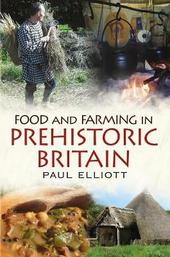
|
Food and Farming in Prehistoric Britain
Hardback
Main Details
| Title |
Food and Farming in Prehistoric Britain
|
| Authors and Contributors |
By (author) Paul Elliott
|
| Physical Properties |
|
| Category/Genre | Cookery, food and drink |
|---|
| ISBN/Barcode |
9781781555088
|
| Classifications | Dewey:641.3009361 |
|---|
| Audience | |
|---|
|
Publishing Details |
| Publisher |
Fonthill Media Ltd
|
| Imprint |
Fonthill Media Ltd
|
| Publication Date |
25 February 2016 |
| Publication Country |
United Kingdom
|
Description
From spit roasting pig to hanging cream cheese from the rafters, from baking roast pork under the ground in pits to cooking trout on wicker frames over an open fire, cooking techniques in prehistoric Britain are ingenious and revealing. There were no ovens and many vegetables and breeds of animal familiar to us today had not yet arrived. In reconstructing some of these techniques and recipes, the author has discovered a different world, with a completely different approach to food. This is native cuisine, cooked in a manner that persisted through the Neolithic, Bronze and Iron Ages. This book first tells the story of prehistoric settlement, and moves on to explore the hunting and foraging techniques of the Mesolithic. After discussing the way in which the Britons farmed, and what they grew, the book moves into the roundhouse and the tools and utensils available. The final half of the book examines the varied techniques used, from covering fish in clay, to baking meat underground, spit roasting, brewing mead, boiling water with hot stones and so on. All the techniques have been carried out by the author.
Author Biography
Paul Elliott has a degree in Ancient History and Archaeology and has written books on military history, cults and secret societies. His previous books for Fonthill were Legions in Crisis and A Roman Soldier on Hadrian's Wall. He has also written several articles for Ancient Warfare magazine. For the past decade he has been active in historical reconstruction and even taught Roman drill and cookery to primary school children.
|